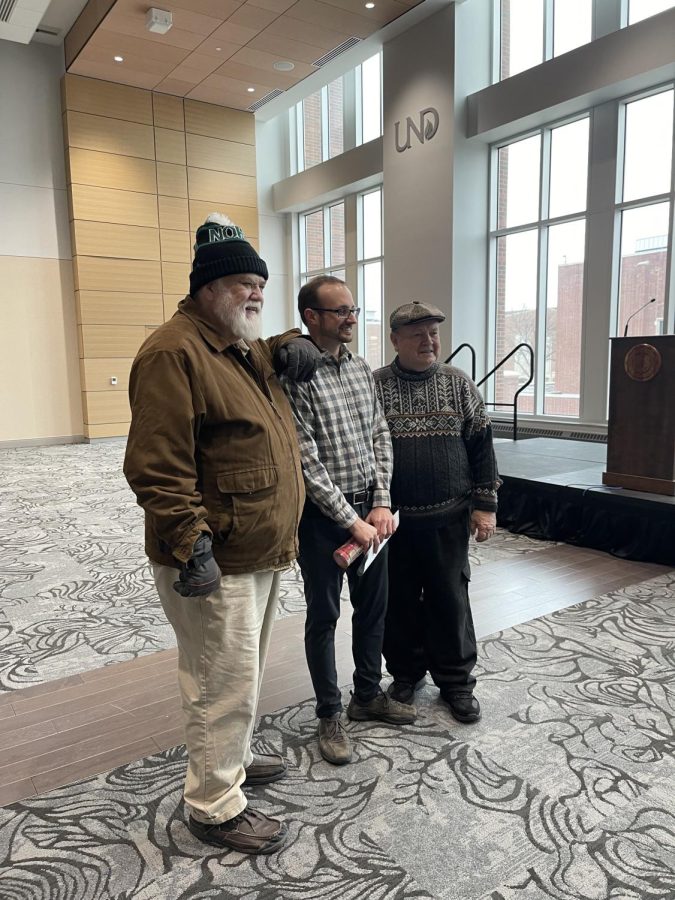Writing From Rink Side
Brad Schlossman gives hagerty lecture
April 26, 2023
There are few hockey journalists in the world quite like Brad Schlossman. The Fargo native and University of North Dakota alumni is a staple of UND hockey, covering the team for The Grand Forks Herald since 2005. Beyond that, he is one of the most respected writers in the college hockey community. He has an encyclopedic knowledge of UND hockey and has correctly predicted the NCAA Championship winning team for the past two years, but he does not keep that knowledge to himself. He gives lectures like this one, answers questions of young sports writers with little knowledge of college hockey and talks to Charles Haga’s introduction to journalism class about what it is like to be a sports journalist. Schlossman is the kind of person to greet every person in the press box and invite a young reporter who was alone at their first NCHC awards dinner to sit next to him. At the end of the day Schlossman is a great writer and more importantly a good person.
Despite his accolades, 2016 North Dakota Sportswriter of the Year and four-time first place winner of Associated Press Sports Editors award for beat writing, to name a few. When introducing himself for the lecture, he cracked a self-deprecating joke about how the former Hagerty lecture speakers had been Pulitzer Prize winners. “They are going to look at the list of speakers and assume this is from the pandemic year, they couldn’t get anybody else, so they brought in the local guy,” Schlossman remarked.
However, Schlossman is one of the best examples of journalism they could ask to speak, especially for those considering a path in sports journalism. His stories have changed league policies like the one he wrote about a referee from a game in Omaha who was hit in the face by a puck. “He had to have permanent plates put in his face, screws, 36 stitches, he had to have his jaw wired shut for a couple weeks, surgery,” Schlossman said. “You know everyone sees the official get hit with the puck in the game and leaves the game and no one thinks anything after the game about it. That would be a great story.”
Schlossman called the injured referee and talked to him about the injury and his recovery process. “At the end I said, ‘does the league cover this?’ he said, ‘no. we’re independent contractors.’ And at that point my story completely changed,” Schlossman said. The referee ended up losing more money due to his medical bills than he would have made working that game even with insurance from his day job. The year after Schlossman wrote that story the NCHC created an insurance policy for the officials who work on their games.
“The officials were very happy about that, and they will talk to me now all the time,” Schlossman said.
Stories like that are Schlossman’s bread and butter. He is more than a pure hockey writer, he is a storyteller, prioritizing the people behind the sport, not the pure statistics and what can be read in a box score.
He has written stories going over what hockey players do before a National Championship game, including a fascinating tidbit that players rarely sleep before championship games. That story gave a personal lens to what the players went through prior to the championship rather than just what happened in that win.
Another amazing story Schlossman discussed was the story of a UND player. He and another UND player had been healthy scratched for a game in Denver and decided to go out and get wings at the Cherry Cricket restaurant. Then one of the players who was slated to play that night got sick, and one of the players who was sitting gorging himself on wings got a call to come to the rink. Even though that player missed warm-ups and had a stomach full of wings, he scored his first goal in that game.
It is not what happened in the game that is the most exciting part of the story, it is the narratives and stories behind the players that played in that game.
Recently the hockey world has been wracked by scandals, the most notable being the Blackhawks 2010 cover up of Kyle Beach’s sexual assault at the hands of a member of the coaching staff. Many Chicago Blackhawks beat writers and sports journalists focused on hockey expressed remorse that they had ignored rumors about the incident in favor of keeping team connections.
When asked about what to do in the conundrum of wanting to keep the trust of players and coaches but also hold people accountable, Schlossman had a simple but excellent answer to this, “if a player’s name is a police report, they should expect to see it in the paper.” He mentioned having to cover multiple tough stories and that even though he wrote about those scandals people would still talk to him.
One of the most important things emphasized by Schlossman was an education on a broad array of subjects. He discussed how his history minor helped him write about athlete activism when two UND players chose to kneel for the national anthem. “We write a lot of things that we aren’t experts in, but we have to try to become experts and lean on other people for that,” Schlossman said. “I often think it’s great to know things, but the best reporters are not the ones that know the most, but the ones who can learn the most. And if you can learn the most, you can translate that into a story.”
Maeve Hushman is a Dakota Student Sports Reporter. She can be reached at maeve.hushman@und.edu.


